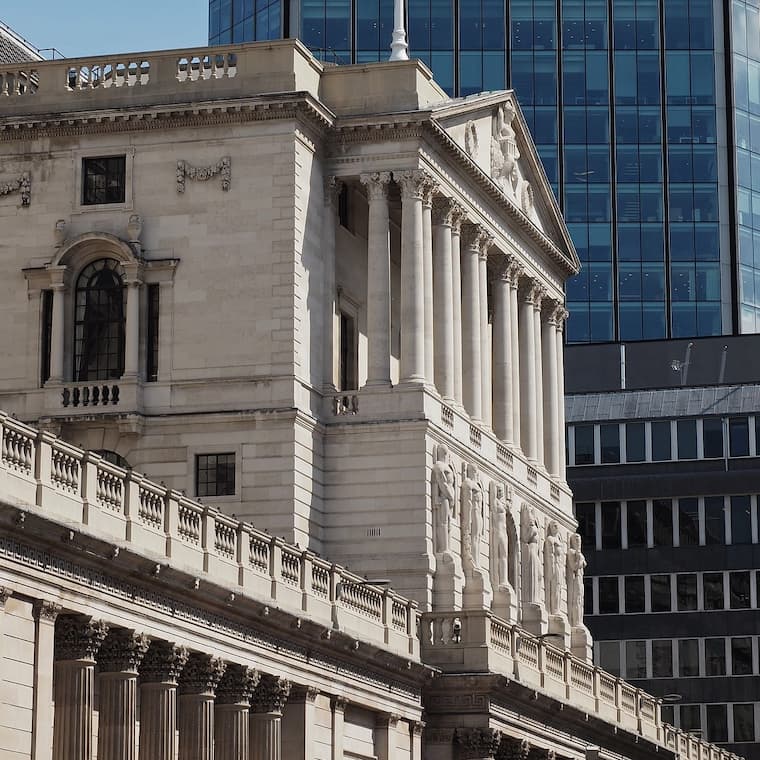Strategy
BoE Keeps Rates Unchanged – Wealth Managers React

After the Bank of England kept interest rates unchanged on Thursday, investment managers discuss the impact.
The Bank of England (BoE) held interest rates at 5.25 per cent on Thursday for the fourth time in a row, the highest level in 15 years, in a bid to tackle inflation.
Six members of the Monetary Policy Committee (MPC) voted to hold rates steady, whilst two preferred to raise rates by 0.25 per cent to 5.5 per cent, to combat inflation, and one preferred a cut to 5 per cent.
UK headline inflation currently stands at 4 per cent, up from 3.9 per cent the previous month. The longer-term target is 2 per cent. It is expected to return to 2 per cent briefly next quarter before rising again later in the year.
The market was expecting interest rates to remain unchanged prior to the announcement. “We need to keep policy sufficiently restrictive for sufficiently long, nothing more, nothing less,” BoE governor Andrew Bailey said.
The US Federal Reserve also held interest rates at 5.25 to 5.5 per cent this week, saying that it is too early to get hopeful about rate cuts.
Here are some reactions from wealth managers to the UK rate decision.
Hetal Mehta, head of economic
research, St James’s Place
“The BoE has confirmed what most market participants had taken as
a given: that the MPC as whole doesn’t have a hiking bias
anymore. However, today’s vote split was not consistent with
market expectations at this stage of the inflation cycle. While
much progress on overall inflation has been made, services
inflation – rightly so – is concerning the BoE. We still think
the BoE is likely to be behind the ECB and Fed in cutting rates.”
Nicholas Hyett, investment
manager, Wealth Club
“Before Christmas, investors had built up a picture of central
bankers as trigger happy rate cutters, just waiting for the first
excuse to get rates falling once again. Stock markets shot up as
a result, and mortgage rates have started to fall.
"Well, there’s little evidence central bankers are rate cut hungry in today’s MPC report. Rates were unchanged as expected, but two MPC members voted to increase rates – arguing that monetary policy need to be restrictive for longer to get core inflation back under control. There’s a certain logic to that. The economy isn’t glowing. But it’s not screaming in distress either. Growth is ping-ponging around zero, and wage growth is slowing but still moving upwards and rising energy prices could yet move inflation higher again later in the year. But monetary policy is a supertanker not a speedboat – leave a change of direction too late and the economy will hit the rocks before central bankers can get it to slow.”
Julian Jessop, economics fellow at the free market think
tank, the Institute of Economic Affairs
“The Bank has at least acknowledged that inflation is on track
for the two per cent target in the spring and that the risks
thereafter are more balanced, so it is even less likely that
rates will be raised again. But the consensus on the MPC is still
that policy will have to remain 'restrictive' for a while yet, so
the first cut will probably not come until May, alongside the
next set of Bank forecasts. Hopefully, this will be a case of
better late than never.”
Tom Lloyd-Jones, CIO, Zenzic
Capital
“The tone of the commentary feels similar to that of US Federal
Reserve but there are clear differences in economic performance
between the UK and the US. While the Bank of England will be
loathe to move ahead of the Fed – the leader of the orchestra –
it may need to.”
Daniele Antonucci, CIO, Quintet Private Bank (parent
of Brown Shipley)
“The important thing for markets was to find extra clues on the
timing of future rate cuts, but that
timing still remains quite uncertain. Our view is that
interest rate reductions will likely come before long, but we
also think markets have got somewhat ahead of themselves with
their expectations of sharp and fast rate reductions.
"Inflation is on a better trajectory now, slowing from about 10 per cent to 4 per cent currently. However, it did re-accelerate slightly over the past month or so and the Bank is arguing that it needs to see more evidence that inflation is falling before implementing cuts. Ultimately, we think UK policymakers will strike a balance. It is likely that they don’t see a compelling reason to rush into a rate cutting cycle just yet. But, with a weak economy and an inflation path that’s now more benign, our sense is that by mid-year they’ll have embarked on a process of measured rate reductions."
April LaRusse, head of investment
specialists, Insight Investment
“The Monetary Policy Committee faced a tricky balancing act today
[yesterday], needing to pivot towards future rate cuts, but
maintaining a sufficiently hawkish position that market
exuberance was kept in check.
“Overall, we think they did a pretty good job. References to further tightening were dropped, but it was made clear that more positive inflation data would be needed before the easing cycle can begin. To hammer home the message two members of the MPC voted for a further hike, while just a single member voted to ease. We continue to think the Bank will be more cautious than markets are expecting, and that the pace of easing will be more gradual than elsewhere.”
